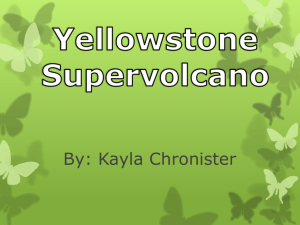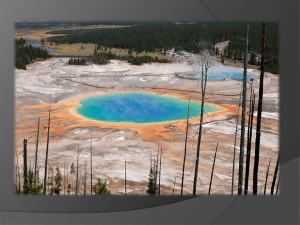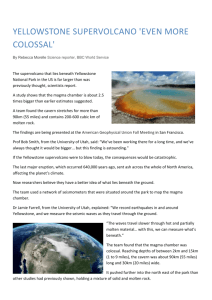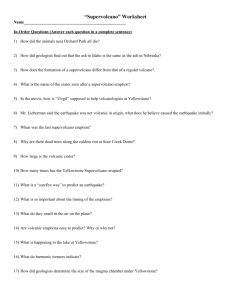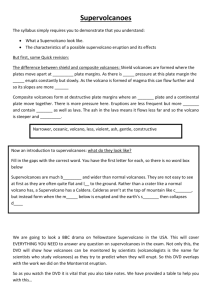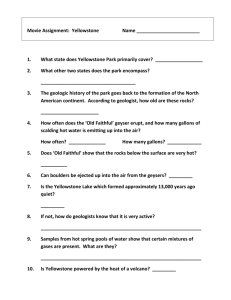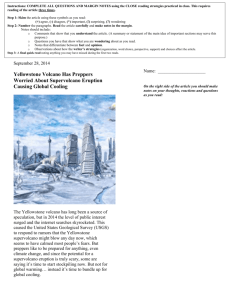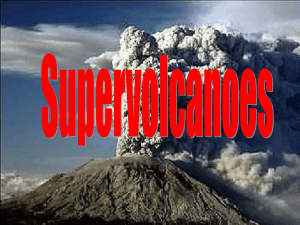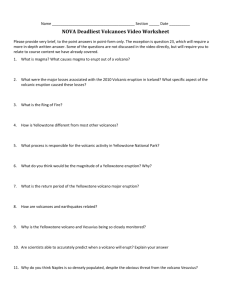Hotspots, Shield Volcanoes and Supervolcanoes
advertisement
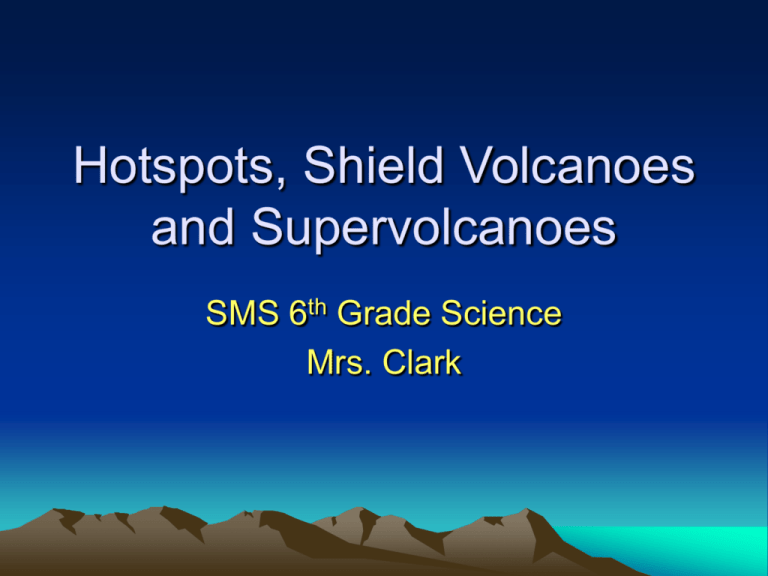
Hotspots, Shield Volcanoes and Supervolcanoes SMS 6th Grade Science Mrs. Clark Not necessarily on the edge of plate boundaries! Shield Volcanoes are formed by ‘hotspots’ “What is a hotspot?”…… A hotspot is… • • • • A rising plume of hot mantle material It melts through the crust Like a blow torch Often lies in the middle of a plate Draw the hotspot and resulting shield volcano (please) Shield Volcano Characteristics • Thin layers of lava build on other thin layers • Lava is thin and runny • Lava pours out in rivers and lakes • Eruptions are quiet and non-explosive • Wide and gently-sloping Examples: Hawaii Islands are formed as the Pacific Plate moves over a fixed hot spot Mauna Loa (Hawaii) Belknap Crater (Oregon) Newberry Volcano (Oregon) Its so flat that you probably wouldn’t even suspect it is a volcano! Where is this shield volcano??? First person to raise their hand with the correct answer gets a piece of candy! This is Olympus Mons, it is on Mars! Olympus Mons • 624 km (374 mi) in diameter – that is like driving from Sherwood to anywhere for 6 hours! • 25 km (16 mi) high • It is 100 times larger than Mauna Loa on Earth. Supervolcanoes (what the heck are they?) • erupt rarely …… • but with a force at least 1000 times that of ordinary volcanoes • caused by hot spots under CONTINENTAL CRUST • Yellowstone is one of a few known examples! Yellowstone Supervolcano • In recent years it has been discovered that Yellowstone is one of a few known examples of a supervolcano. • A large part of the national park area is a giant crater formed by the last explosion 640,000 years ago. • It is so large that it can only be seen from space. • It explodes regularly every 600,000 years - in between it is quiet, now it is 40,000 years overdue. Yellowstone Supervolcano from space….. Yellowstone Supervolcano ….. (you can see the tracks over the continental crust as the N. American plate has moved) Yellowstone Supervolcano • Modern humans did not exist last time this exploded but its effects are known - a herd of fossilized rhinos were found choked to death under the ash layer a thousand miles away. • Try to imagine 1000 volcanoes erupting in the same place at the same time! The Last Time Yellowstone Supervolcano Erupted…. (the brown area was covered with ash) Yellowstone Supervolcano Most of America was buried under several feet of volcanic ash - and there were vast amounts of choking sulfurous gases. This has been going on for at least 10,000,000 years. The craters (calderas) from the last 3 eruptions have been identified and date from 600,000 years, 1,200,000 years and 1,800,000 years. Yellowstone Supervolcano There is a giant blob of red hot magma 8,000 meters below Yellowstone, it has been building up since the last eruption and is fed from a hot spot below. It is now 50 Km long, 30 Km wide and 10 Km deep and is full of dissolved gasses at enormous pressure. Yellowstone Supervolcano The gases are the cause of the explosion that occurs once the eruption is underway - the magma pools below the surface under great pressure. When the steady build up of pressure finally forces a way through to the surface the effect is similar to removing the cork from champagne - the gases suddenly leave the liquid they were dissolved in and blow the liquid out of its container. Once an eruption starts it will accelerate until the whole pool of magma explodes, throwing at least 1000 cubic kilometers of hot material high into the atmosphere. Some Scientists believe that this is likely to happen soon, the area north of the lake has bulged upwards by almost a meter in 50 years. One side of the lake is creeping into the forest as the land rises. This type of rapid change cannot continue for long without something giving way, every year there are hundreds of small earthquakes. Earth Science Journal Pages 10 and 11 • Page 10: Title ‘Stratovolcanoes’ • Draw a colored diagram of a stratovolcano and list 5 facts (from your notes) about it underneath your diagram. • Below that, give 3 examples of stratovolcanoes • Page 11: Title ‘Shield Volcanoes’ • Draw a colored diagram of a Shield Volcano and list 5 facts (from your notes) about it underneath your diagram. • Below that, give 3 examples of shield volcanoes
